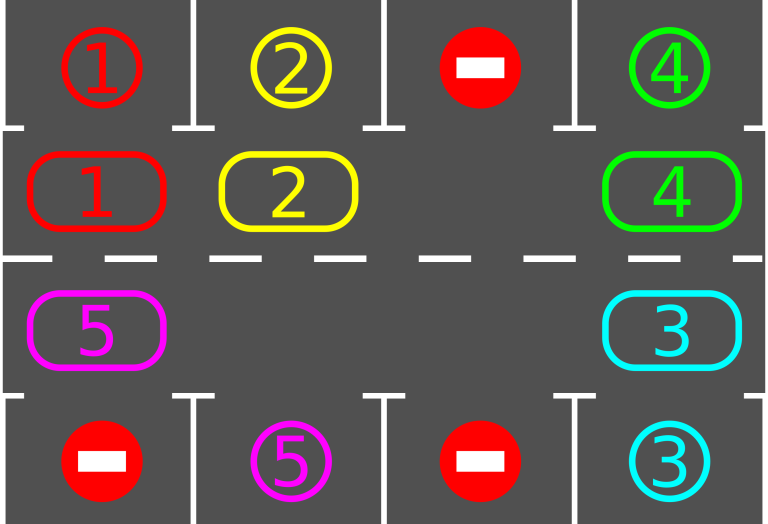大概这一场考的还算可以吧..
上来刚A...然后A死难写...
然后B是水题..
C猜了个结论错掉了,也找到了反例
然后后面干脆的直接把数据random_shuffle以后再跑这个贪心...
就过了...
D..
感谢Q巨...
Q巨猜了个结论让我交了一发..
然后过了...
========================================================
A题
给你一个4*n的网格图,第一行第四行是停车场
第二行第三行是过道

现在一共有k辆车(编号1~k)停在过道上,你需要把它们挪到正确的位置上
你一旦将一辆车停入停车区,就不可以移动它,也就是说你必须让正确的车进入正确的位置
求一个20000步以内的方案,n<=50,k<=2n
做法;
你可以考虑,整个2*n的区域直接把它变成一个环,
例如上图
把它变成
1->2->0->4
^ |
| v
5<-0<-0<-3
的一个环,然后在这个环上每次移动一个车,顺便把前面所有的车都往前推一格(或者推进目的地)
时间复杂度O(100*99+100) 99表示最多移动99下才能到目的地(这个环上)
我们就一直让它转直到所有车都到目的地
(如果位置是满的,而且一开始没有车可以到目的地,输出-1)
实现的时候不是这么写的..而是把每个没到终点的都往终点推...
B题
2n个数,1~n各出现2次
每次可以交换两个连续的数
问几次能让每个数出现的两次是连续的
n<=100
直接...暴力把跟第一个相同的拖到第二个....然后依次做下去...
C题
n个向量,长度<=1e6
每个向量可以选择+1或者-1倍,要求
最后向量的和加起来长度<=1.5*1e6
我的做法:
直接每次让当前向量和下一个合并,取小的那一个
如果最后发现错了,就把数据random_shuffle一下,再做一次,直到做出来为止
过了,虽然不知道为啥
std做法:
每次三个里面,肯定有两个(可能经过乘以-1后)会有一对成为一个120°以外的角
那么两个<=1e6的向量加起来还在1e6以内
那么最后就可以得到两个,加起来一定在1.5*1e6(实际上在sqrt(2)*1e6)以内
D题:
A和B在玩一个游戏
它们在填一个n位的二进制数,每次随机一个人过来选一位填成0或者1
最后得分是c[二进制数数值]
A要让它尽量大,B要让它尽量小
问期望得到的值是多少,然后接下来r次修改
每次修改c数组里面一个数的值,然后再询问
n<=18
r<=218
做法:
直接所有的c的和然后除以2^n
Q老师的结论...
EF不会做
A
#include<set>
#include<map>
#include<list>
#include<queue>
#include<stack>
#include<string>
#include<math.h>
#include<time.h>
#include<vector>
#include<bitset>
#include<memory>
#include<utility>
#include<fstream>
#include<stdio.h>
#include<sstream>
#include<iostream>
#include<stdlib.h>
#include<string.h>
#include<algorithm>
using namespace std;
#define move moasudoasjsap
int a[4][55];
struct move
{
int id;
int x;
int y;
move (int iid=0,int xx=0,int yy=0)
{
id=iid;
x=xx+1;
y=yy+1;
}
void output()
{
printf("%d %d %d
",id,x,y);
}
};
vector<move> ans;
bool vis[105];
int n;
int newx,newy;
void find_next(int sx,int sy)
{
newx=sx;
newy=sy;
if (sx==1)
{
if (sy==0)
{
newx++;
}
else
{
newy--;
}
}
else
{
if (sy==n-1)
{
newx--;
}
else
{
newy++;
}
}
}
void find_way(int sx,int sy,int tx,int ty,int id)
{
if ((sx==tx)&&(sy==ty)) return;
find_next(sx,sy);
int ttx=newx;
int tty=newy;
if (a[newx][newy]!=0)
{
if (a[ttx^1][tty]==a[ttx][tty])
{
ans.push_back(move(a[ttx][tty],ttx^1,tty));
vis[a[ttx][tty]]=true;
a[ttx][tty]=0;
}
else
{
find_next(ttx,tty);
find_way(ttx,tty,newx,newy,a[ttx][tty]);
}
}
ans.push_back(move(id,ttx,tty));
a[ttx][tty]=id;
a[sx][sy]=0;
find_way(ttx,tty,tx,ty,id);
}
int main()
{
#ifdef absi2011
freopen("input.txt","r",stdin);
freopen("output.txt","w",stdout);
#endif
int k;
scanf("%d%d",&n,&k);
int i;
for (i=0;i<4;i++)
{
int j;
for (j=0;j<n;j++)
{
scanf("%d",&a[i][j]);
}
}
if (k==n+n)
{
for (i=1;i<=2;i++)
{
int j;
for (j=0;j<n;j++)
{
if (a[i][j]==a[i^1][j])
{
ans.push_back(move(a[i][j],i^1,j));
vis[a[i][j]]=true;
a[i][j]=0;
break;
}
}
if (j!=n) break;
}
if (i==3)
{
puts("-1");
return 0;
}
}
for (i=1;i<=k;i++)
{
if (vis[i]) continue;
int j;
int final_x,final_y;
int start_x,start_y;
for (j=0;j<n;j++)
{
if (a[0][j]==i)
{
final_x=1;
final_y=j;
}
if (a[3][j]==i)
{
final_x=2;
final_y=j;
}
if (a[1][j]==i)
{
start_x=1;
start_y=j;
}
if (a[2][j]==i)
{
start_x=2;
start_y=j;
}
}
find_way(start_x,start_y,final_x,final_y,i);
ans.push_back(move(i,final_x^1,final_y));
a[final_x][final_y]=0;
vis[i]=true;
}
printf("%d
",ans.size());
for (i=0;i<ans.size();i++)
{
ans[i].output();
}
return 0;
}
B
#include<set>
#include<map>
#include<list>
#include<queue>
#include<stack>
#include<string>
#include<math.h>
#include<time.h>
#include<vector>
#include<bitset>
#include<memory>
#include<utility>
#include<fstream>
#include<stdio.h>
#include<sstream>
#include<iostream>
#include<stdlib.h>
#include<string.h>
#include<algorithm>
using namespace std;
int a[1005];
int main()
{
#ifdef absi2011
freopen("input.txt","r",stdin);
freopen("output.txt","w",stdout);
#endif
int n;
scanf("%d",&n);
int i;
for (i=0;i<n+n;i++)
{
scanf("%d",&a[i]);
}
int ans=0;
for (i=0;i<n+n;i+=2)
{
int j;
for (j=i+1;j<n+n;j++)
{
if (a[i]==a[j])
{
int k;
for (k=j;k>i+1;k--)
{
swap(a[k],a[k-1]);
ans++;
}
}
}
}
printf("%d
",ans);
return 0;
}
C
#include<set>
#include<map>
#include<list>
#include<queue>
#include<stack>
#include<string>
#include<math.h>
#include<time.h>
#include<vector>
#include<bitset>
#include<memory>
#include<utility>
#include<fstream>
#include<stdio.h>
#include<sstream>
#include<iostream>
#include<stdlib.h>
#include<string.h>
#include<algorithm>
using namespace std;
struct vv
{
int x;
int y;
int id;
};
vv v[100005];
int ans[100005];
int main()
{
#ifdef absi2011
freopen("input.txt","r",stdin);
freopen("output.txt","w",stdout);
#endif
srand(time(0));
int n;
scanf("%d",&n);
int nowx=0,nowy=0;
int i;
for (i=0;i<n;i++)
{
int x,y;
scanf("%d%d",&x,&y);
v[i].id=i;
v[i].x=x;
v[i].y=y;
long long t1=(long long)(nowx-x)*(nowx-x)+(long long)(nowy-y)*(nowy-y);
long long t2=(long long)(nowx+x)*(nowx+x)+(long long)(nowy+y)*(nowy+y);
if (t1<t2)
{
ans[i]=-1;
nowx-=x;
nowy-=y;
}
else
{
ans[i]=1;
nowx+=x;
nowy+=y;
}
}
if ((long long)nowx*nowx+(long long)nowy*nowy>(long long)1500000*1500000)
{
for (;;)
{
random_shuffle(v,v+n);
int nowx=0,nowy=0;
for (i=0;i<n;i++)
{
int x=v[i].x;
int y=v[i].y;
long long t1=(long long)(nowx-x)*(nowx-x)+(long long)(nowy-y)*(nowy-y);
long long t2=(long long)(nowx+x)*(nowx+x)+(long long)(nowy+y)*(nowy+y);
if (t1<t2)
{
ans[v[i].id]=-1;
nowx-=x;
nowy-=y;
}
else
{
ans[v[i].id]=1;
nowx+=x;
nowy+=y;
}
}
if ((long long)nowx*nowx+(long long)nowy*nowy<=(long long)1500000*1500000)
{
for (i=0;i<n;i++)
{
printf("%d ",ans[i]);
}
printf("
");
return 0;
}
}
}
for (i=0;i<n;i++)
{
printf("%d ",ans[i]);
}
printf("
");
return 0;
}
D
#include<set>
#include<map>
#include<list>
#include<queue>
#include<stack>
#include<string>
#include<math.h>
#include<time.h>
#include<vector>
#include<bitset>
#include<memory>
#include<utility>
#include<fstream>
#include<stdio.h>
#include<sstream>
#include<iostream>
#include<stdlib.h>
#include<string.h>
#include<algorithm>
using namespace std;
int a[1<<18];
int main()
{
#ifdef absi2011
freopen("input.txt","r",stdin);
freopen("output.txt","w",stdout);
#endif
int n,r;
scanf("%d%d",&n,&r);
int k=(1<<n);
int i;
long long sum=0;
for (i=0;i<k;i++)
{
scanf("%d",&a[i]);
sum+=a[i];
}
printf("%.12lf
",sum*1.0/k);
for (i=0;i<r;i++)
{
int x,y;
scanf("%d%d",&x,&y);
sum-=a[x];
a[x]=y;
sum+=y;
printf("%.12lf
",sum*1.0/k);
}
return 0;
}